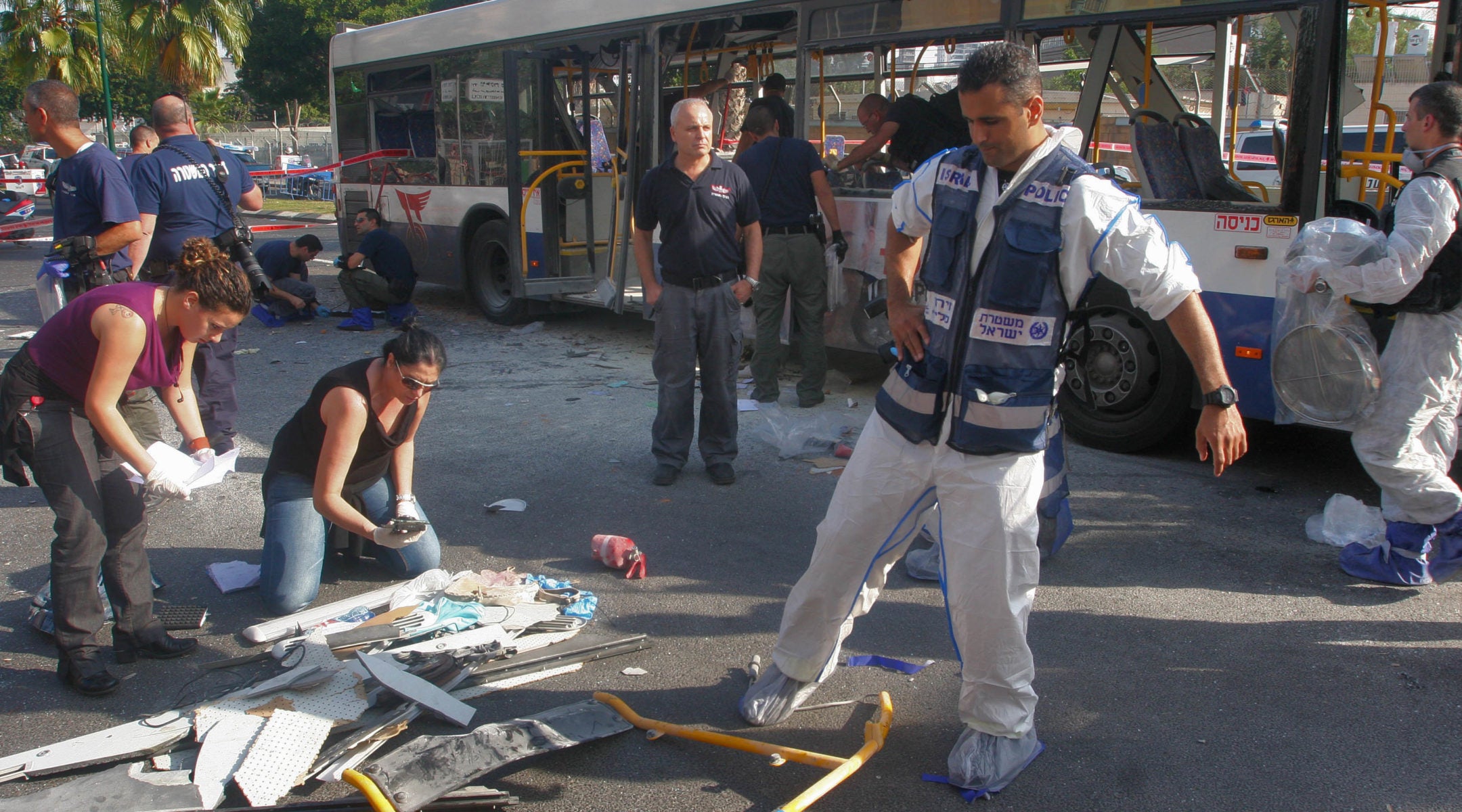TEL AVIV (JTA) – They all thought it was a missile at first.
In the split second between the sudden explosion and the smoke that enveloped their bodies and faces, they figured that a Hamas rocket, after a week of strikes and misses, had hit the center of Tel Aviv. Then they realized that the bus had been bombed.
“The bus stopped, there was an explosion and everything was black,” Elinor Lampel, who was driving next to the bus, told JTA. “I didn’t understand. There was no warning siren. When the smoke cleared, I saw it was a terrorist attack.”
Police said a bomb stuffed with ball bearings and screws was placed on the bus. At least 21 passengers reportedly were wounded, two of them seriously.
The explosion was followed quickly by the shrill blare of ambulances, fire trucks and police cars converging on the city center, and helicopters hovering overhead. Police officers, soldiers and paramedics swarmed the few blocks surrounding the bus, cordoning off a large swath of empty streets. The bus remained in the middle of the road, with the frame mostly intact bu the windows blown out.
A week into Israel’s operation in Gaza, Tel Aviv residents had come to expect sirens warning of imminent Hamas missile attacks. But this latest attack, which came as the bus was passing the Kirya, the military headquarters located in the center of Tel Aviv, more closely resembled those of the second intifada, when Palestinian terrorists routinely detonated bombs on crowded Israeli city buses. The last time a terrorist bomb went off in the city was 2006, when a restaurant was targeted.
The Al-Aksa Martyrs’ Brigade, which is affiliated with Palestinian Authority President Mahmoud Abbas’ Fatah party, claimed responsibility for the attack and said that the terrorist who carried it out managed to escape, according to reports. The Popular Resistance Committees also claimed responsibility for the bombing.
Before either group had claimed responsibility, Israeli Internal Security Minister Yitzhak Aharonovich told reporters that either Hamas or Islamic Jihad terrorists perpetrated the bombing.
As of Wednesday night, police were still searching for a man who fled the scene of the bus bombing. They also increased patrols throughout the city.
Five Israelis and more than 140 Palestinians have been reported killed since Israel launched Operation Pillar of Defense on Nov. 14 with the assassination of Hamas military chief Ahmed Jabari. The assassination followed several days of intense rocket bombardment on southern Israel, and Hamas stepped up its rocket fire against Israel after the operation began. Hamas missiles have reached as far as the Jerusalem and Tel Aviv areas nearly 50 miles away.
Egyptian-brokered cease-fire negotiations between Israel and Hamas are ongoing.
Israelis should “concentrate on targets in Gaza and see who did this,” Aharonovich said. “The most important thing is for them to stop firing at the South.”
Hamas’ rocket attacks notwithstanding, the bus bombing is a sign that Gaza’s terrorists are eager to expand the range of their attacks and use whatever means they can to strike in Israel.
Police spokesman Micky Rosenfeld said police suspect that a terrorist entered the bus, placed a relatively small bomb in the middle of the aisle and exited before it blew up. Another bomb was placed on the bus did not detonate, he said.
Bus driver Nahum Herzig said the bus had been crowded but not full, and that nobody on the bus had aroused his suspicions.
“I couldn’t find anybody I could point to as suspicious,” he said. While drivers had been told to take the usual precautions against bus bombings, “we didn’t get specific warnings.”
Herzig, who was uninjured, began to tend to wounded passengers, as did Lampel, who teaches a course in first aid. But before they knew it, paramedics were pushing them into ambulances.
Another wounded passenger, Tal Bechor, said she had just realized that she was on the wrong bus and planned to get off at the next stop when the explosion went off.
“I was sure a missile had hit,” she said. “I lost consciousness for a few minutes, and then I checked my head.”
Bechor said her head, ears and knees hurt.
Lampel had been returning to her home in Rishon Lezion, the city just south of Tel Aviv that on Tuesday had suffered a direct missile hit on an apartment building.
“It’s not pleasant at all,” she said. “There’s a lot of fear.”
JTA has documented Jewish history in real-time for over a century. Keep our journalism strong by joining us in supporting independent, award-winning reporting.






